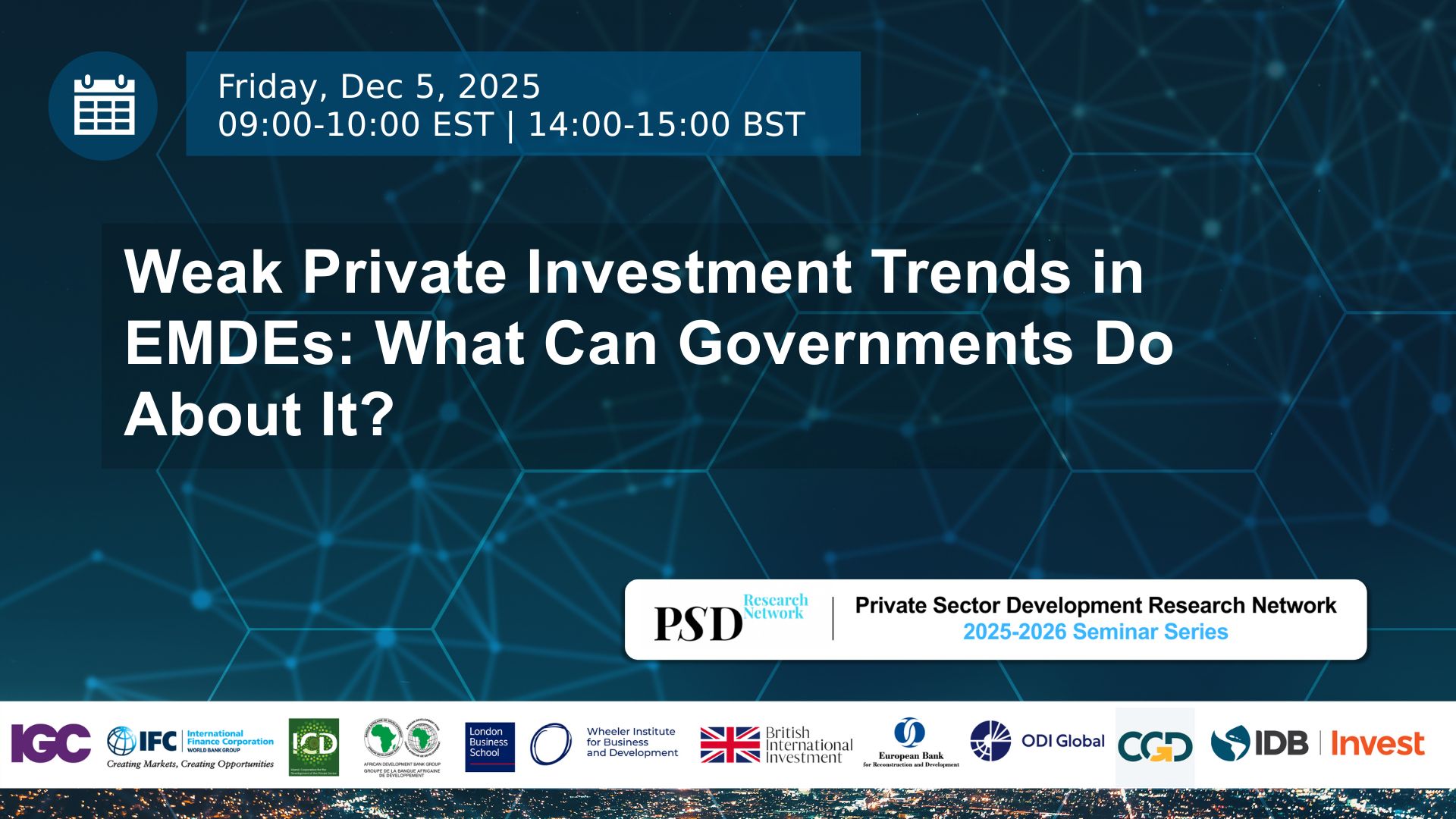
Weak Private Investment Trends in EMDEs: What Can Governments Do About It
Watch the recording here:
Presented by Nancy Lee, Samuel Matthews, and James Reid
Center for Global Development

Organized by the Private Sector Development Research Network
hosted by the Center for Global Development (CGD)
Friday, 5th Dec 2025 from 9-10am EST
Click here to join virtually the day of the seminar
ABOUT THE SEMINAR
This seminar will be looking at private investment and bank credit to the private sector as a share of GDP in EMDEs in this century. It finds worrisome levels and trends, especially compared to private investment ratios for economies that achieved sustained high growth in the last century. As exogenous shocks proliferate and growth slows, EMDEs need better evidence on structural policies that help boost private investment ratios. The World Bank’s new B-Ready database scores governments’ investment-related policies and services across 1200 indicators per economy (for an initial sample of 50 economies), organized in 10 topics and 3 pillars.
The paper tests the hypothesis that there are significant correlations between these scores and private investment outcomes. The B-Ready detail helps governments identify areas of strength and weakness. But governments need help in setting priorities across 1200 scores. Setting priorities requires evidence not only about the scores themselves but also about which indicators are most correlated with actual private finance flows.
Taking due account of the limitations of analysis based on correlations, the findings suggest that, as a point of departure, governments would do well to pay attention to policies and systems that confer economy-wide benefits attractive to private finance providers. While there are differences between foreign investors, domestic investors, and bank lenders, the evidence points overall to the importance of trade openness, efficient e-payment systems, e-procurement systems, and support for local competition and innovation (including intellectual property protection for domestic innovators). The cost of making and receiving e-payments and trade openness stand out as significant factors for all three sources of finance.
ABOUT THE SPEAKERS
Nancy Lee is a senior policy fellow and Director for Sustainable Development Finance at the Center for Global Development. She is also a senior advisor at the Center for Strategic and International Studies. Her work at CGD focuses on the role and performance of multilateral development banks and development finance institutions, mobilizing private development finance, blended finance, sovereign debt restructuring architecture, public-private infrastructure finance, and gender lens investing.
Previously, she was the deputy chief executive officer of the Millennium Challenge Corporation (MCC), an innovative, independent US aid agency that fights poverty through country compacts that support inclusive growth. Key MCC attributes are rigorous country selection, country ownership of compacts, data-driven resource allocation, results accountability, and transparency.
Prior to joining MCC, Dr. Lee was the general manager (CEO) of the Multilateral Investment Fund (MIF) at the Inter-American Development Bank, the Bank’s laboratory for private sector-led development and a key impact investor in the region. Under Dr. Lee’s leadership, the MIF launched initiatives in lending to women-owned SMEs; a public-private partnership to scale youth job training programs; a program to introduce social impact bonds to the region; innovative climate finance models; and a crowdsourcing platform for development solutions.
Details of Dr. Lee’s work can be found here.
Samuel Matthews is a Research Associate for the Sustainable Development Finance team with a particular focus on public sector debt sustainability. He previously worked at an investment firm and interned with the Project on Prosperity and Development at the Center for Strategic and International Studies. Samuel attended the Catholic University of America where he received a bachelor’s in International Economics and Finance and a master’s in Integral Economic Development Management.
James Reid is a program coordinator with the Sustainable Development Finance team at the Center for Global Development. Before joining CGD, he interned with two not-for-profit organizations, including the Jefferson Area Board for Aging, where he assisted the philanthropy team with grant research to support capital-raising initiatives. Born in South Africa, James developed a deep interest in supporting the economic advancement of developing countries. James holds a B.A. in Mathematics and Economics from the University of Virginia, where he graduated in May of 2024.





